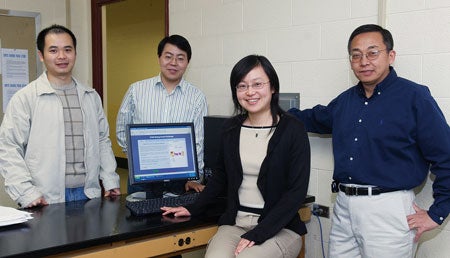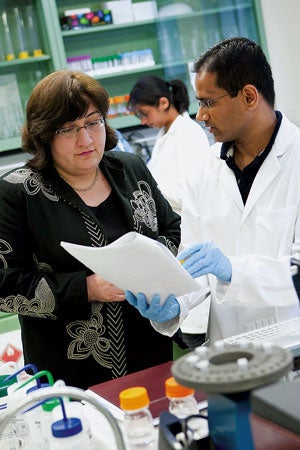Patented Solutions
Recent faculty inventions help keep us healthy, safe, and shopping

Keeping Online Ratings Honest
As online shopping continues to grow in popularity around the globe, shoppers increasingly depend upon consumer-based systems that vendors like Amazon.com and eBay use to rate products and sellers. But those rating systems are easily manipulated, misleading many shoppers and causing them to make purchases they may not have otherwise.
 To detect the tainted ratings, engineering professors Yan Sun, Steven Kay, and Qing Yang, along with former student Yafei Yang, Ph.D. ‘08, developed several algorithms that can combat collaborative, profit-driven manipulations of online rating systems.
To detect the tainted ratings, engineering professors Yan Sun, Steven Kay, and Qing Yang, along with former student Yafei Yang, Ph.D. ‘08, developed several algorithms that can combat collaborative, profit-driven manipulations of online rating systems.
To demonstrate the value of online rating systems, Sun points to a recent survey that found that consumers are willing to pay at least 20 percent more for services that receive a 5-star rating than for the same service receiving a 4-star rating. And a 2006 study found that many eBay sellers artificially boost their reputations by buying and selling positive ratings.
Sun said that systems already exist that can detect obvious efforts to manipulate online ratings, but her algorithms have been designed to detect “smart attackers” who try to make subtle changes to a product’s rating. The system reduces rating bias by two-thirds.
To test their system, the URI team challenged computer scientists and hackers to attack a rating system protected by its detection program, offering a $1,000 cash prize to the person who influenced the ratings the greatest. They then used the 408 attack attempts and interviews with participants to improve the system.
By Todd McLeish
Photo courtesy of Yan Sun

Smart Barcode Signals Food Spoilage
If you have ever wondered whether the milk in your grocer’s refrigerator might have gone bad or if you left the pre-packaged meats on your kitchen counter too long, then a partnership between two chemistry professors and a food safety company will soon put you at ease.
Barcodes created by SIRA Technologies for use on refrigerated food products will incorporate ink that will turn red when conditions indicative of contamination exist. The barcode will then be rendered incapable of transmitting data when scanned at the grocery store.
We’ve all heard about people who have been sickened by contaminated food in recent years,” said Chemistry Professor Brett Lucht, who, with colleague William Euler, developed the polymer that is added to the barcode ink to make it change color. “Our partnership with SIRA Technologies is creating a smart packaging system that will prevent thousands of people from getting ill.”
The researchers began studying thermochromic pigments—those that change color at certain temperatures—a decade ago. The heat-sensitive material they developed generated interest from more than 100 companies that sought to incorporate it into dozens of different products. A version that does not revert to its original color after changing captured the attention of SIRA Technologies.
“If even 10 percent of the packages of chicken and milk and beef sold around the world have the SIRA barcode on them, that could generate millions of dollars for the URI research program,” Lucht said. “Only time will tell.”
By Todd McLeish
Photo by Michael Salerno

Pain-free Monitoring of Medication Levels
Pharmacy Professor Fatemeh Akhlaghi has discovered how to use saliva to monitor concentrations of anti-rejection drugs in patients who undergo organ transplants.
She said that saliva offers a pain-free way to measure levels of immunosuppressive agents such as cyclosporine and mycophenolic acid, which are essential in preventing organ rejection after transplantation.
“Routine concentration measurement for these agents is currently done through blood tests that are usually performed twice a week in a clinic or hospital,” Akhlaghi said. “Our method uses saliva to measure these drug levels. Saliva tests are especially useful for children and the elderly. With the elderly, blood draws can be difficult because of the loss of muscle and connective tissue, making the veins less stable and more prone to bruising.”
Frequent testing of medication levels in transplant patients is required because if the concentration of an immunosuppressive agent is low, the patient risks rejection of the organ, and if the concentrations are high, the patient risks infections and toxicity.
Not only is Akhlaghi’s drug monitoring method effective, it also provides more precise measures of the drugs’ effects. And, she said: “Saliva allows non-invasive specimen collection by the patient at home. Patients can just put the sample in the mail.”
Obtaining a sample would be as simple as spitting in a cup or taking a swab of the mouth, Akhlaghi said. “Because a transplant patient remains dependent on life-long therapy with a cocktail of immunosuppressive agents, a non-invasive monitoring procedure is important. It’s all about improving the patient’s quality of life.”
By Dave Lavallee’79 M.P.A. ’87
Photo by Joe Giblin
 Home
Home Browse
Browse Close
Close Events
Events Maps
Maps Email
Email Brightspace
Brightspace eCampus
eCampus


